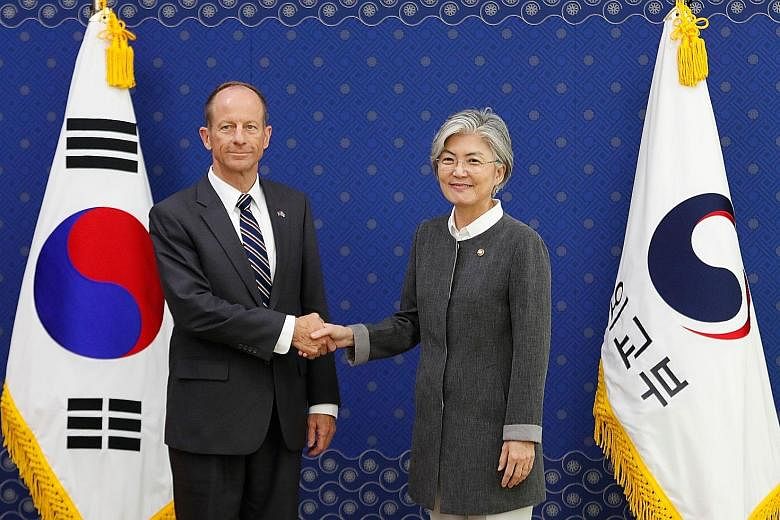The United States will do what it can to help end the trade spat between its allies South Korea and Japan, a senior US diplomat said as South Korea warned that Japan's export curbs go against the spirit of free trade and will adversely affect the global tech industry.
Mr David Stilwell, the new Assistant Secretary of State for East Asian and Pacific Affairs, said the US places "a great priority" on strengthening ties with both countries and that he hopes the two sides can resolve the issue soon.
"The US as close friends and allies to both will do what it can to support their efforts to resolve (the situation)," said Mr Stilwell, who is in Seoul for a three-day visit and met South Korean officials, including Foreign Minister Kang Kyung-wha, yesterday. He leaves today.
His comments came as South Korea said the government is preparing a series of measures to ease the country's dependence on Japanese materials, components and equipment.
In what Seoul views as economic retaliation to a previous dispute over wartime forced labour, Tokyo from July 4 started imposing export restrictions on three chemicals crucial to South Korea's booming semiconductor industry - fluorine polyimide, resists and etching gas.
Japan, which controls up to 90 per cent of the global supply of these materials, cited a breach of trust and national security concerns for the measures. It also accused South Korea of illegally shipping some of these sensitive materials to North Korea - a charge that Seoul denies.
Concern is growing that Japan will broaden its trade restrictions, such as striking South Korea off a white list of countries that enjoy preferential treatment for trade. Japan's Cabinet is expected to approve the move on July 24.
Yesterday, South Korean Finance Minister Hong Nam-ki renewed calls for Japan to withdraw its export restrictions.
Speaking at a regular meeting with officials, he also said they are working on comprehensive plans to reduce South Korea's reliance on Japan for high-tech raw materials and these will be announced soon.
Reports have already emerged that South Korea's two largest chipmakers, Samsung and SK Hynix, have begun testing the use of locally produced etching gas - also known as hydrogen fluoride - in making memory chips.
Experts say it would be difficult but not impossible to replace Japanese materials with those made in South Korea. But it could take months of testing and it remains to be seen if local suppliers can achieve the same high-precision quality.
A government official noted that "we've done this in the past".
He recalled how a law was passed when the late Kim Dae Jung was president (1998 to 2003) to allow the government to invest heavily in the production of components and parts.
The official, who spoke to foreign media yesterday, voiced hope that South Korea and Japan could find a diplomatic solution for their spat.
"Korea and Japan should resolve, in a constructive manner, historical matters and enter into a future-oriented relationship, especially in light of Japan's declaration of a new era of Reiwa," said the official, who asked not to be named.
"We believe we can settle the dispute... through constructive dialogue with Japan," he added.
While there are hopes that the US could step in to mediate, the official said he did not ask for US intervention when he met Mr Stilwell.
He noted that while diplomatic mediation by the US had worked in the past, this time, "we said yes but Japan said no" when the US offered to convene a high-level trilateral meeting in Tokyo.
But the official said he did convey to the US the severity of the trade spat, the detrimental effects of escalation and the importance of de-escalation. Mr Stilwell "fully understood" the serious nature of this issue, he added.
Today is the deadline for South Korea to respond to Japan's suggestion to seek third-party arbitration for the issue that sparked the spat - a ruling by South Korea's Supreme Court last year that Japanese steelmakers should compensate Koreans forced to work as labourers for them during the war.
The situation worsened when South Korea began seizing the Korea-based assets of the firms that refused to comply.
On Tuesday, South Korea's presidential Blue House said it will not accept Japan's offer of arbitration.
Asked why South Korea is averse to arbitration, the official said arbitration could take a long time and might still end with a split decision.
He added: "We are open to constructive suggestions and we will try to exercise flexibility. We have been suggesting all along that we put all options on the table to sort out the best solution to resolve this once and for all."

